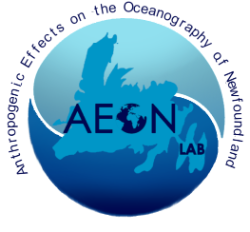AEON Laboratory
Anthropogenic Effects on the Oceanography of Newfoundland - Laboratory

Who we are: Located at the Ocean Sciences Centre, the Aeon Lab (Anthropogenic Effects on the Oceanography of Newfoundland) comprises a diverse group of researchers, whose varied educational, cultural and geographical backgrounds foster an environment of innovation, allowing us to effectivel address emerging research questions.
What we research: The AEON-Laboratory focuses on understanding the ocean and its ability to respond to anthropogenic changes such as climate change, oil spills, and microplastic pollution. In particular, we are interested in
(i) the functioning of the Biological Carbon Pump (BCP) and how it shifts with climate change,
(ii) the changes in plankton community composition along the Labrador Coast, specifically at the ice-sea interface, and how such changes in food web structure affect local, indigenous communities,
(iii) the distribution and fate of oil spilled in marine or fresh waters with emphasis on the interactions with marine particles and bacteria,
(iv) the distribution and sources of microplastic in the ocean.
See Research Projects for more details.
How we approach our research: Our team conducts laboratory experiments to address specific questions or hypothesis; such as
(i) what causes the fragmentation of marine snow?
(ii) which types of microplastic are incorporated into marine snow?
(iii) what types of effects oil has on mussels or fish?
(iv) whether marine organic matter impacts the chemical dispersibility of oil.
Additionally, we regularly conduct field work to assess, for example,
(i) the microplastic distribution in Placentia Bay, Bay D’Espoir and Fortune Bay, NL,
(ii) the potential for microbial oil biodegradation in the Great Lakes,
(iii) the drivers of carbon flux in the Labrador Sea.
Frequently, field research and experiments complement each other.